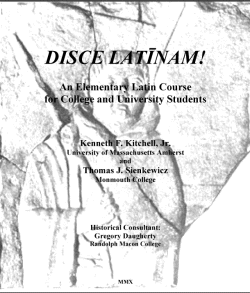|
Honesty and Plagiarism:
Students are encouraged to do their homework together. All
other classwork, especially quizzes and exams, must be the student's own
work. Plagiarism, i.e., copying someone else's work without giving credit,
is to be avoided. Such copying--from a book, another classmate's paper, or
any other source--is dishonest. Any student submitting plagiarized work will
receive a failing grade for that assignment. If two papers with identical or
nearly identical work are submitted by different students, both papers will
receive a failing grade.
Caveat:
This syllabus is subject to revision by the instructor,
provided that written or verbal notice is given in class.
Course Description:
This course is primarily directed towards students desiring to meet the
freshman requirements for graduation under the foreign language component of
the Language rubric. Elementary
Latin can also fulfill partial requirements for a major in
Latin or Classics.
The Monmouth College catalogue gives the following description of courses
that meet the Language requirement:
|
The creation and use of language is the most significant achievement of
human beings, for our ability to organize our understanding in verbal
symbols and to communicate sets us apart from all other life forms. The
symbols of our language make communication possible at many different levels
of meaning and allow us to translate our private experience into universal
terms.... A sure understanding of language is the foundation of all
knowledge, and the ability to use verbal symbols effectively is the most
important of all skills.
This component provides that every student have experience with a second
language. The study of a foreign language allows students to see that their
native language often reflects cultural needs and interests at the same time
that it shares many basic patterns with other languages. |
The aim of these courses is to learn basic reading and writing skills in
Latin as quickly and as thoroughly as possible. At
the end of two terms of Elementary Latin a student
should know the fundamentals of Latin grammar,
have a basic Latin vocabulary, and be able to read
any Latin text with the help of a dictionary.
Speaking and listening skills in Latin will be
encouraged only in order to assist the development of reading and writing
Latin. READING Latin is
much more important than speaking or writing it.
|
Texts
for Latin 101/102 |
 |
|
Kitchell and Sienkewicz.
DISCE LATĪNAM!
field testing version with complete vocabulary
and exercises
to be published by Prentice Hall in 2010
Nota bene: You will receive ONE three-hole
punched copy of chapters 1-20 free of charge from your instructor.
You will need to provide your own three-ring binder to hold these
materials. If you lose this copy, it is your own responsibility to
acquire a replacement.
Electronic copies of this text as well as
ancillay materials can be found at
http://department.monm.edu/classics/disce
|
| |
|
|
 |
|
Robin M. Griffin, Ed Phinney.
A Student's Latin Grammar
Publisher: Cambridge University Press
Pub. Date: May 1992
ISBN-978-0521385879 |
|
Back to the Top |
Class Goals
and Format:
Class usually meets on Mondays, Tuesdays, Wednesdays, and Fridays from
8:00 A.M. until 8:50 A.M. in the Capron Classics Room of Wallace Hall.
Occasionally classes will meet on Thursdays (in
order to replace
regular meetings the instructor cannot attend).
Participants should not make commitments for
other activities on Thursdays 8-9 while this class is in session.
There will be daily homework assignments. In addition, there may be a number supplementary readings in
Latin and map work.
Summary of Grading:
The goal is for all students to earn the best possible grade. The
grading system is designed to give each student maximum control of the
final grade earned. The focus of all assignments, quizzes and tests is
not grading but learning.
Exams:
There will be at least four full-period exams during the
semester. The dates for all exams will be announced at least
one week in advance. Students will be encouraged to
correct their exams for half credit on points lost.
|
Homework:
Class participation and daily homework
assignments will count as one exam grade. Sometimes homework
assignments will be graded in class. Other time they will be
graded outside of class by the instructor. But these
assignment will ALWAYS be collected and a grade recorded.
Grading of these assignments is simple. You will receive 75
points for submitting the assignment and another 25
points for giving it a good try. There is no reason, then,
why anyone cannot earn an average of 100 on homework
assignments. You will automatically be excused from three
homework assignments but will receive no points for any
additional unsubmitted assignements. No later homework
will be accepted for grade. |
Quizzes:
There will be at least one quiz per week. These
quizzes, which can be either announced or unannounced, will last 5-10
minutes at the end of class. The average of these quizzes
will count as one exam grade. |
Oral Presentation:
During the final exam period, and in lieu of a
traditional final exam, students (working individually or in
groups) will prepare an oral presentation for the class.
This presentation will be created in consultation with the
instructor and will make significant use of textbook
materials. This presentation will be graded based upon
accuracy and quality of preparation. This grade will count
as one exam grade. |
|


